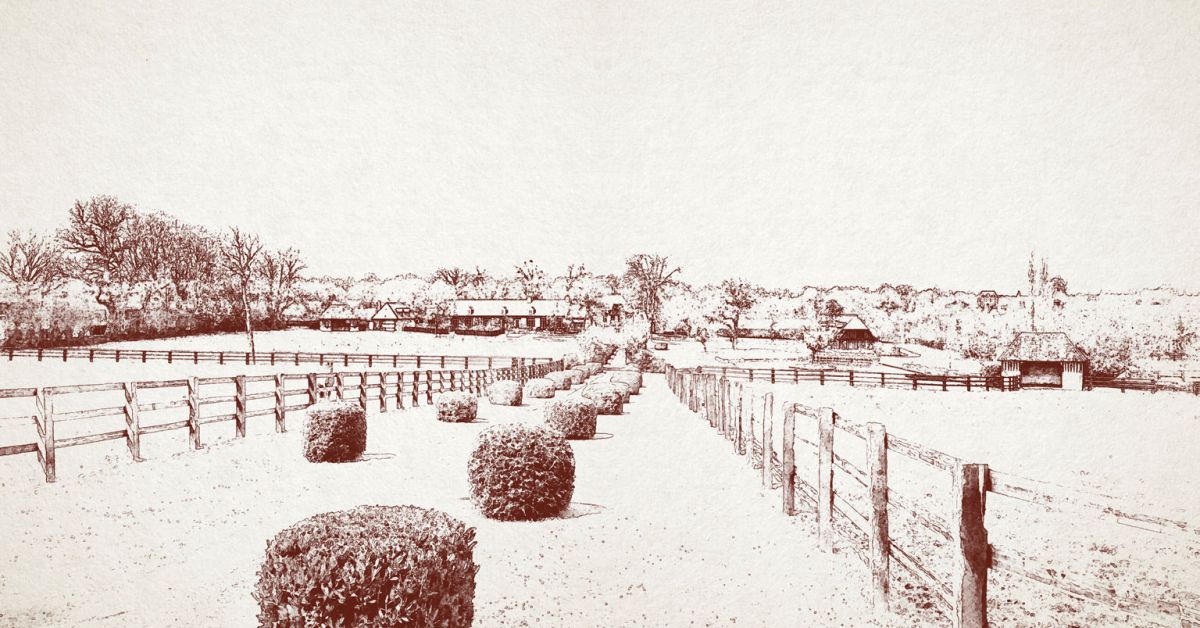Wallonie : +32 (0)86 321 400
Bruxelles : +32 (0)2 895 32 97
Flandres : +32 (0)2 895 32 97

Focus on equestrian real estate
Nathalie Berleur Corrin, together with her husband, runs the estate agency Cofim, a combination, a group in fact which is present on several markets: the traditional market of selling and renting residential or commercial properties, the less traditional market of buying and selling enterprises and business assets and, finally, the far more specialised market of equestrian and farm properties. Despite her extensive experience – gained over some twenty years - , Nathalie Berleur Corrin has chosen to return to university where she is following the Executive Programme in Real Estate (Solvay Business School).
Cofim proposes to its clientele equestrian properties with or without accommodation in a price range from about 499,000 euro to… nearly 10 million euro (see above: a property near Turnhout with “an impressive residence”). However, the Brussels estate agent has opted for a diversified approach to the market: equestrian complexes, riding schools and other professional installations are assigned to a separate section. There too, the prices start at around half a million euro – and even less for a small riding school (395,000 euro) – rising to up to 12 million euro for an international level equestrian centre within a property of 8 hectares entirely devoted to competition and adapted to the organisation of competitive events (offices, accommodation, a large number of tracks).
This type of property is negotiated “off market”. In fact, the properties on offer “off market” are not communicated to the general public. There is therefore no advertising in the press or on the internet. These are investments for which sellers and buyers are put into contact discreetly by specialised intermediaries. In other words, the “off market” properties are available on a specialised, confidential market confined to the happy few.
Legislation x 3
Nathalie Berleur Corrin recalls - for those who may have forgotten – that regionalisation has the effect that there are three different sets of legislation on spatial planning and the environment. This is not without its consequences on the equestrian market, the value of property and the assessment of its potential. The Walloon Territorial Development Code (Code de développement territorial wallon) (the CoDT, recently revised), the Brussels Spatial Planning Code (Code bruxellois de l’aménagement du territoire (CoBAT)/Brussels Wetboek van Ruimtelijke Ordening – (BWRO)) and the Flemish Spatial Planning Code (Vlaamse Codex Ruimtelijke Ordening (VCRO)) diverge for example with respect to the conditions for the granting of environmental permits, which are compulsory.
It is therefore in the interests of both amateurs and professionals who acquire a property, and especially if they wish to make modifications, to make inquiries beforehand concerning the legislation in force in the region in which the property they are interested in is located. Make inquiries to whom? The relevant authority – it is easy to find on the internet by Googling the abbreviations CoDT, CoBAT or VCRO – but “above all to professionals. Our profession means that we monitor this legislation closely”, Nathalie Berleur emphasises.
-242-9d4cf942.jpeg)
Looking to the future
The enlightened amateur or professional seeking an equestrian property must consider all the aspects of the transaction they are undertaking. For a new project, all the land costs, registration fees, surveyor and architect fees, possible demolition costs, soil survey and decontamination, site development costs, taxes and of course the purchase price of the property, “which varies according to its location”, Nathalie Berleur Corrin points out, “but also its purpose and assignment”. In other words, the local planning provisions, the Sector Plan in Wallonia, the Regional Land Use Plan (PRAS) in Brussels and the Regional Plan in Flanders. Are you still following?
It is therefore necessary to be vigilant. “However”, Nathalie Berleur Corrin continues, “the most important thing, at present, is to look to the future”. Nowadays, design and realisation of a contemporary riding school involves taking sustainable development into account, reflecting on all the environmental aspects and “analysing more generally what you want to do to obtain more uses, services, functionalities, etc.” A discourse which is also heard in the business world.
This is not all – far from it. And once again, it is a concern which is encountered everywhere: given that the society in which we live is (increasingly) connected, “digitisation also concerns the equestrian sector. The riding schools are also connected and it is a boon”, says Nathalie Berleur Corrin, “because digitisation allows modern management, remotely. In short, time is saved in the overall management of the site, whether for the riders, the horses, the stable hands, the owners or the managers of the site. Creating simplified management and use leads to greater profitability.” This says it all.
The “off market” and the regulations
The expression “off market” is rather misleading. It could imply that there is no control, no guarantee and no transparency for transactions of this type. That is obviously incorrect. There, as elsewhere, a property transaction can be undertaken only through an intermediary registered on the roster of professionals – in Belgium, this is the Professional Institute of Estate Agents (Institut professionnel des agents immobiliers – (IPI)) or a notary, the only exception confirming the general rule.
It is obligatory for estate agencies working on this market to be subject, like all the others, to the code of conduct and they must have taken out a professional liability insurance and the required suretyship. Any bogus estate agent, i.e. any intermediary who is not registered at the IPI, is committing a criminal offence punishable by custodial sentence. And buyers or sellers calling on the services of a non-accredited intermediary are running high risks. Moreover, the primary objective of the Belgian legislation on the subject is to protect buyers and sellers of real estate.
Anecdotally, the IPI has a team of private detectives whose task is precisely to track down non-accredited intermediaries.
Stables of the future
Nathalie Berleur Corrin (Cofim) sees a long way ahead – even a very long way.
In a short text which she sent us, she wrote that “the design and sustainable conception of modern stables are among the challenges of tomorrow.”
In her view, “the wellbeing of the horses involves taking into account fundamental points to be respected in the design and realisation of an equestrian structure project. Air quality, light, acoustics, comfort in terms of odours, heating and humidity, must be borne in mind. These factors can generate stress if the equestrian buildings are poorly designed.”
“Design”, Nathalie Berleur Corrin continues, “permits reflection on the conception of any equestrian structure and environment. Equestrian design gives rise to reflection for greater functionality, service and security for the horses, the practitioners, the stable staff and all the persons involved. Design allows customised projects to be devised to personal specifications, consistent with the technical and budgetary possibilities of the site, equestrian common areas to be experienced, equestrian suites, which refers in particular to the accommodation for the riders and stable staff, barns and all the equestrian structures to ensure eco-friendliness.”

Interview de Cofim par Jean Blavier - Journaliste
Equi-Book #11 Déc. 2017 - Focus on Equestrian Real Estate

Equibook #11 - Déc. 2017
Wallonie : +32 (0)86 321 400
Bruxelles : +32 (0)2 895 32 97
Flandres : +32 (0)2 895 32 97
Mail :
Copyright © 1999 - 2021 COFIM s.r.l. | Siège social sis à 4190 XHORIS - Godinry n° 2 | Siège d'exploitation sis à 1050 BRUXELLES - Avenue Louise n° 480 (Brussels IT Tower - 18ème étage) | I B.C.E. & T.V.A. : BE 0466.122.018
Agent Immobilier Intermédiaire – Syndic & Régisseur agréé IPI N° 100.847 - 511.439 / Agréations octroyées en Belgique| Compagnie d'assurance professionnelle : AXA Belgium s.a. - N° de police 730.390.160.
Autorité de surveillance : Institut Professionnel de l’Immobilier sis à 1000 Bruxelles (Belgique) - Rue du Luxembourg n° 16B | www.ipi.be Soumis au code de Déontologie conformément à l'A.R. du 27 septembre 2006
Responsable en charge du blanchiment d'argent & du RGPD
Création du site par Zzam.be
30 years of experience
30 years of existence, 30 years of experience, 30 years of progress, ...

